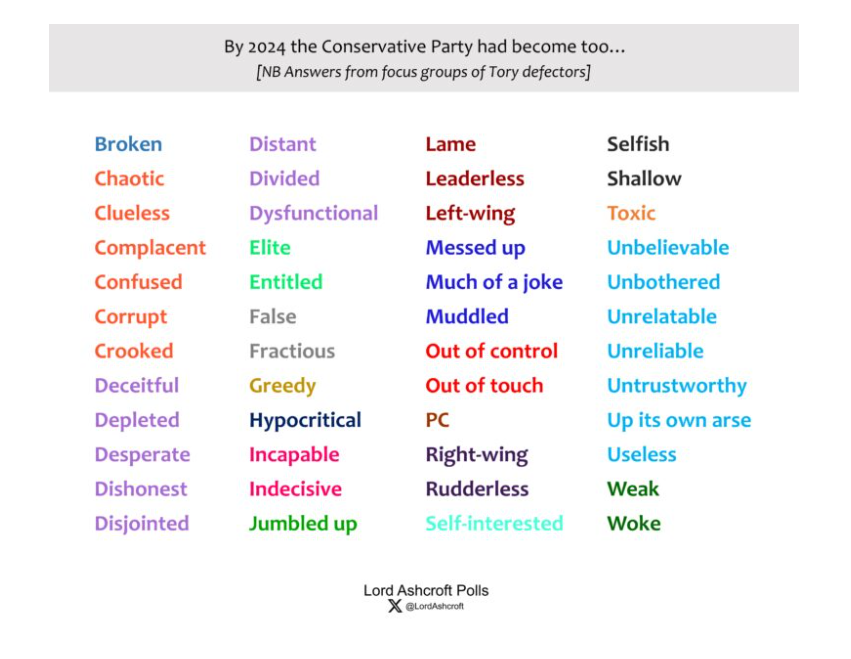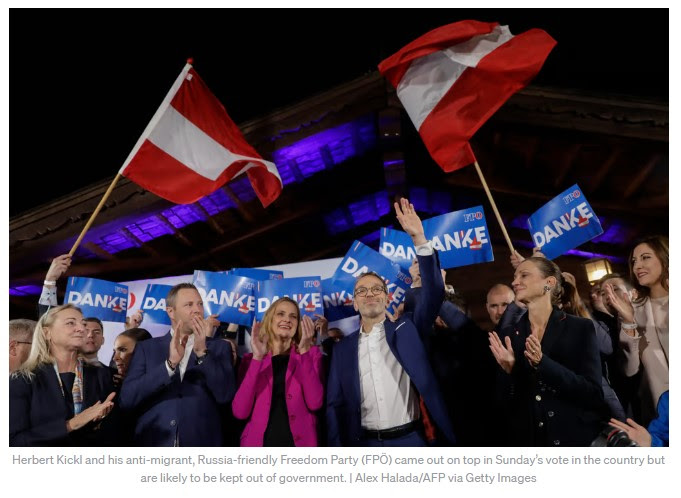[ad_1]
Just as Labour’s victory was fuelled by Conservative chaos, the Tories’ chances of a comeback will hinge on whether Labour can deliver on its promises.

The Conservatives gathered in Birmingham this week for their first conference since being reduced to 121 MPs and entering opposition. It was, on all accounts, a masterclass in bickering, finger-pointing, and deflection, highlighting why the Tories are not fit for office.
Still blissfully unaware of her role in the economic car crash, Liz Truss said it was ‘pathetic’ to blame the financial meltdown on her, and that she would have done a better job than Rishi Sunak in the general election. Robert Jenrick evoked anger by claiming British special forces are “killing rather than capturing terrorists”. The leadership hopeful also tore into the European Convention of Human Rights (ECHR), claiming the party will “die” if it doesn’t commit to quitting the convention. James Cleverly said it was a mistake for Sunak to say he would ‘stop the boats.’ Tom Tugendhat warned against his party becoming Reform UK, and Kemi Badenoch faced a backlash by claiming statutory maternity pay is ‘excessive,’ despite the UK having one of the lowest maternity pay rates in the OECD. She even suggested that 10 percent of civil servants (50,000 people) should be imprisoned for hazily defined crimes and that the minimum wage harms business. Kemi, bless her, is clearly bidding for the Liz Truss Cup for talking complete political tripe. By way of contrast, Andrew RT Davies, leader of the Welsh Tories, introduced a note of sanity, in warning that the party must change quickly or “die.”
As the blue-on-blue attacks rumble on, the real question now is why did the Tories crash so spectacularly in the general election, and can they ever recover?
‘Losing It’
Lord Ashcroft, a self-made Tory tax exile who sparked the David Cameron ‘Piggate’ rumours, and one of the party’s biggest donors, claims to have the answers. In his new book Losing It: The Conservative Party and the 2024 General Election, Ashcroft draws conclusions from polling, data analysis and conversations with voters as to why, in his words, “a defeat turned into the trouncing of a lifetime.”
In a post-election survey, Ashcroft asked people which statement they thought was the best and worst explanation for the Conservative defeat. The least convincing was the idea that people were very keen to have a Labour government with Keir Starmer as prime minister. The most convincing explanation was that “the Conservatives had lost people’s trust”, followed by “the Conservative government had not been competent” and “partygate and other scandals.” Failure to deliver on promises, the 2022 mini-budget, no longer representing traditional Tory voters, and too many leaders in recent years were further down the list but contributed to the overall lack of trust and perception of incompetence that constituted the main reasons for defeat.
Ashcroft also asked 2019 Conservative voters who had switched parties by 2024 to complete the sentence – “By 2024, the Conservative Party had become too…” Along with more expected adjectives like hypocritical, incompetent, and out of touch, terms such as woke, politically correct, and left-wing were mentioned. The fact that some voters could describe Sunak and his colleagues, who once promised to put an end to ‘woke nonsense,’ as woke, reveals a particular and rather strange mindset among certain voters.

Talking about unwoke, when asked specifically about their views on Reform UK, 22 percent of Conservative voters in 2024 expressed interest in Nigel Farage’s ideas and policies and indicated they would consider voting for the party. This sentiment was also shared by 5 percent of Labour and Liberal Democrat voters. While Farage and Reform UK primarily appeal to disillusioned Conservative supporters, their platform appears to resonate with a small segment of voters from across the political spectrum, suggesting broader discontent with the major parties.
A pact with Farage? Not so fast
Before the election, columnist Simon Heffer argued in The Telegraph that the Tories needed to form a pact with Nigel Farage’s Reform Party to avoid electoral disaster. As we now know, no such pact happened, and the Tories were indeed obliterated at the polling stations.
One of the most radical proposed paths for the party to take following their trouncing, would be to merge with Reform, creating a single right-wing party, similar to that of Canada’s Progressive Conservatives and Canadian Alliance twenty years ago.
When asked specifically about a potential Tory/Reform merger by Ashcroft, a quarter of 2024 Tory voters and just under half of Tory-Reform switchers said they would like to see the Conservatives become more like Reform in terms of their policies and priorities, but not merge.
Ashcroft’s findings concur somewhat with those of a YouGov survey of Tory members conducted in mid-August. This poll found party disunity to be the main reason for the election defeat, but Conservative members appeared to be more critical of specific policies than the general public surveyed by Ashcroft. The failure to address immigration was identified as the second most common reason for the party’s loss, following internal divisions and infighting, suggesting that Reform’s hardline stances, particularly on issues like immigration, are attracting voters who feel the Conservatives have failed to deliver on key promises.
A separate YouGov poll asked what Tory members think the future direction of the Conservative party should be. Half of the members surveyed said they were opposed to any merger with Reform but think the party should move further to the right. Notably, more than twice as many strongly oppose any merger (31 percent) than strongly support one (14 percent), suggesting an attempted unification would struggle to carry a significant chunk of the party with it.

An interesting report by the centre-right think tank Onward, unveiled at this week’s Conservative conference, argues against a drift to the right. Onward’s Breaking Blue report, based on a study of over 24,000 participants, notes how the Tories were defeated across all major demographics, including class, Brexit stance, ethnicity, and age.
The report maps out a “route back” for the party, suggesting the next Conservative leader must repair the party’s tarnished reputation for competence, trust, and handling of immigration. It claims that while younger voters are important, the priority should be winning back older voters. “The party simply won’t have any chance of winning again until it can convince 50–64-year-olds to vote Conservative again,” it says.
Like the YouGov poll, the Breaking Blue report acknowledges the devastating impact of events like Partygate and the mini-budget, which severely damaged the party’s reputation for competence and honesty. It concludes that the 2024 election was essentially “unwinnable” and that the party’s voter blocs collapsed simultaneously.
To rebuild an electoral coalition, Onward advises the party to unite groups that historically leaned right, either economically or culturally, while also attracting mainstream swing voters. A pact with Reform, it warns, would be disastrous. Instead, the future Conservative leader must target defectors from both the Liberal Democrats and Reform, as focusing on just one group “will not be enough to win a majority.”
Sebastian Payne director of Onward commented on how the report puts forward a clear path for the next Tory leader to take, “repair the Conservatives’ reputation on trust on competence on immigration, public services and reducing taxes for lower and middle income earners.”
“There are no easy answers — and any deal with Nigel Farage or Reform would be a catastrophic mistake.”
Voter’s remorse
In the New Statesman this week, George Eaton argues that Labour’s woes present an opportunity for the next Conservative leader. Eaton cites a new study by More in Common that shows 17 percent of Labour supporters already regret their vote and the public narrowly prefer Rishi Sunak’s government to Starmer’s (by 31 percent to 29 percent).
“An increasingly volatile electorate – the trend that allowed Labour to recover from a bad defeat in a single term – could aid the Tories. Only around a fifth of former Conservative voters rule out supporting the party again,” writes Eaton.
Europe moves to the far right
With Kemi Badenoch and Robert Jenrick, both flagbearers of the Tory right leading the race to be the party’s next leader, a lurch further to the right seems likely, a trend that would mirror what’s happening in Europe.

Across Europe, the far-right is gaining ground. Just last week, Austria’s far-right Freedom Party (FPO) celebrated a historic electoral victory, with Herbert Kickl’s party securing 28.9 percent of the vote, almost three points ahead of the conservative People’s Party (OVP), though still falling short of a majority. The FPO advocates for strict immigration policies and has pushed for “remigration,” the deportation of asylum seekers to their home countries. It also supports banning the right to asylum as a step towards citizenship. But forming a coalition could prove challenging for Kickl, a divisive figure, as the Social Democrats, Greens, and Neos have all ruled out partnering with the far-right. The only viable coalition option for Kickl’s party is with the Conservatives.
Kickl’s success is the latest in a series of far-right victories across Europe. In Italy, Giorgia Meloni leads a right-wing coalition as head of the far-right Brothers of Italy party, and in Germany, the AfD recently topped the polls in the eastern state of Thuringia. France’s National Rally won the European Parliament elections in June. In the Netherlands, anti-Islam populist Geert Wilders won the 2024 Dutch election but has struggled to form a coalition due to a lack of support from other parties. Wilders claimed that times are changing, with “identity, sovereignty, freedom, and no more illegal immigration/asylum” becoming the rallying cry for millions of Europeans.
Britain meanwhile bucked the European trend by electing a centre-left Labour government, leaving the Conservatives with a huge job to restore their reputation. Whether the party shifts further to the right or not presents a dilemma. The centre ground has moved towards Keir Starmer’s version of the Labour Party, which, despite a rocky start, has five years to prove itself. The poll data suggests that if the Conservatives do not embrace a more right-wing position, they risk losing the remaining support they have. Yet they have to do so without going all Farage. Politics can be a difficult game.
Despite their monumental struggles, I wouldn’t count out the 190-year-old institution that’s woven into the fabric of British life just yet. Just as Labour’s victory was fuelled by Conservative chaos, the Tories’ chances of a comeback will hinge on whether Labour can deliver on its promises.
Right-wing media watch – Allison Pearson stoops to new low over Starmer’s sausage slip
Labour’s opponents must have thought Christmas had come early when Keir Starmer referred to the “return of the sausages” in Gaza instead of “hostages” in his first address to the Labour members as prime minister.
Naturally, the memes flooded social media, and the Tories whipped together a Star Wars-themed meme for their TikTok page before you could say “Luke Skywalker.” And who can blame them? All those times the liberals gleefully ripped into Boris Johnson’s never-ending gaffes.
It was time for revenge.
But Allison Pearson, the Daily Telegraph’s star columnist, took the mockery one step further. In a characteristically blistering column, she used the gaffe to equate Starmer as being an antisemite somehow. Yes really.

“Starmer’s slip-up shows how little he cares about Israel’s hostages,” read the headline.
“It was unforgivable,” Pearson continued. “Keir Starmer was too busy feeding red meat to Labour’s pro-Palestine bloc with his demand that Israel brings about a halt to the war.”
“A bit of hollow grandstanding, play to the Islamist sympathisers who pose an electoral threat to Labour while making a token reference to the Jews. Huge applause in the hall, cheers. Job done!”
Try telling Palestine supporters, many of whom believe the Labour brand has been eternally tarnished over Starmer’s position on Israel, that the new prime minister is an antisemite. In truth, Starmer is trying to walk a very narrow path which involves being broadly pro-Israel while condemning the Israeli government’s disproportionate actions in Gaza and still looking for a two-state solution to the Palestinian issue. In all of this the one thing that can be said with absolute certainty, is that there is no way that Starmer is antisemitic.
Pearson’s attack was not only absurd but completely ignored the heckler who interrupted Starmer’s speech, shouting about Gaza. Starmer tried to defuse the situation by quipping: “This guy’s obviously got a pass from the 2019 conference. We’ve changed the party.”
Now that comment might have been seen as pompous and deserving of criticism, but Pearson, unsurprisingly, chose to omit this episode entirely, as it didn’t quite fit the message of her column.
She even expressed nostalgia for Gordon Brown, the same Gordon Brown who in a 2009 column in the Daily Mail, she referred to as “behaving like a toddler about to have his train set taken away at 20 paces. We want a prime minister, not a human tantrum.”
Perhaps in another 15 years, Pearson will look back fondly on Starmer too, once she’s moved on to her next target.
Smear of the week – Trump’s toxic rhetoric hits new extreme, claiming Kamala
Harris is “mentally disabled”
Is there anything Trump won’t say to score cheap points and stir up a reaction? The problem is every time he does, it ends up making him look more unhinged, juvenile, and desperate than before. His latest jibe at Vice President Kamala Harris was a new low, even by his standards.
Speaking at a rally in Wisconsin last weekend, the former president claimed Harris was born “mentally impaired” and is “mentally disabled.”

“Joe Biden became mentally impaired. Kamala, was born that way. She was born that way,” Trump told the audience. The comment sparked widespread shock and outrage, except among Trump’s loyal supporters at the rally who erupted in laughter.
Maria Town, president and CEO of the American Association of People with Disabilities, described the Republican nominee’s language as “ableist.”
“Donald Trump’s ableist comments today say far more about him and his inaccurate, hateful biases against disabled people than it does about Vice President Harris, or any person with a disability,” she said.
Town reminded how several former US presidents have lived with disabilities. Franklin Delano Roosevelt’s used a wheelchair after surviving polio. John F Kennedy battled Addison’s disease, and Ronald Reagan suffered hearing loss and possibly Alzheimer’s in his later years.
But facts don’t seem to concern Trump, who’s made blaming Harris for everything, including the increase in migration to the US, a pillar of his campaign.
“And if you think about it, only a mentally disabled person could’ve allowed this to happen to our country. Anybody would know this,” he continued.
Apart from the disgusting inflammatory language, Trump’s claims are false. Several Biden administration officials have confirmed that Kamala Harris was tasked with understanding the root cause of mass migration in Central American countries and leading diplomatic efforts to reduce those causes.
Perhaps the most worrying of Trump’s recent antics isn’t the latest Harris smear, but his warm comments about Keir Starmer after a dinner following the PM’s UN General Assembly speech. “I actually think he’s very nice,” Trump said. Which is okay in that a British prime minister must seek to get along with whoever is president of the United States even one as repulsive as Donald J Trump. Let us hope that November brings a result that means Starmer will never have to be ‘nice’ with Trump again.
Gabrielle Pickard-Whitehead is author of Right-Wing Watch
To reach hundreds of thousands of new readers we need to grow our donor base substantially.
That’s why in 2024, we are seeking to generate 150 additional regular donors to support Left Foot Forward’s work.
We still need another 117 people to donate to hit the target. You can help. Donate today.
[ad_2]
Source link



